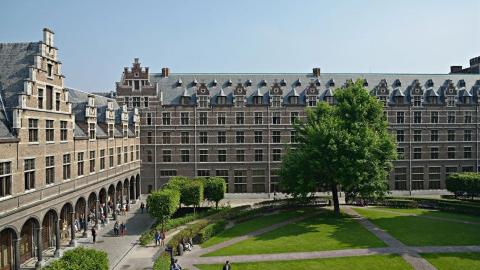University of Antwerp - Particle Physics Group
Institute

Particle Physics Group
Physics Department
Groenenborgerlaan 171
B-2020 Antwerp
Belgium
+32-3-265-3560

Particle Physics Group
Physics Department
Groenenborgerlaan 171
B-2020 Antwerp
Belgium
+32-3-265-3560
Physics education at the University of Antwerp is organised in a bachelor/master structure. The bachelor programme includes the necessary basic knowledge of physics and mathematics. The master programme is a training at an advanced level, followed by a specialisation in one of the following domains: elementary particle physics, solid state and nanophysics, bio- and medical physics, computational physics and theoretical physics. These specialisations reflect the research strengths of the Physics Department.
The Particle Physics Group at the University of Antwerp has a long and outstanding tradition in experimental and phenomenological research concerning particle collisions as conducted by the largest particle accelerator in the world, the Large Hadron Collider at CERN (Switzerland). Our research focuses on the study of quantumchromodynamics, the search for Higgs boson, the search for extra dimensions of space, the search for sterile neutrinos at the Belgian BR2 reactor and most recently the monitoring of gravity waves with the future Einstein Telescope.
De opleiding Fysica aan de Universiteit Antwerpen wordt georganiseerd in twee cycli. In de bachelor Fysica wordt de noodzakelijke grondige kennis van fysica en wiskunde meegegeven. Een deel van het programma mag de student vervangen door een minor in een andere discipline. Momenteel worden twee minoren expliciet aangeboden: Wiskunde en Biochemie.
Het curriculum van de masteropleiding omvat een basisvorming op hoger niveau, gevolgd door een verdieping in één van de belangrijke deelgebieden van de fysica. Het Departement Fysica biedt drie specialisatierichtingen aan: vaste-stof- en materiaalfysica, bio- en medische fysica en elementaire-deeltjesfysica. Deze specialisaties leunen aan bij het onderzoek dat in het departement Fysica wordt uitgevoerd.
De Elementaire-deeltjesgroep van de Universiteit Antwerpen heeft een lange en uitstekende traditie in experimenteel en fenomologisch onderzoek betreffende deeltjesbotsingen bij o.a. de grootste deeltjesversneller ter wereld, de Large Hadron Collider te CERN (Zwitserland).
Ons onderzoek spitst zich toe op de studie van de kwantumchromodynamica (QCD), de zoektocht naar het Higgs-deeltje, de zoektocht naar extra dimensies van de ruimte, de zoektocht naar steriele neutrino's in de Belgische BR2-reactor en meest recentelijk de detectie van zwaartekrachtgolven met de toekomstige Einstein Telescope.

